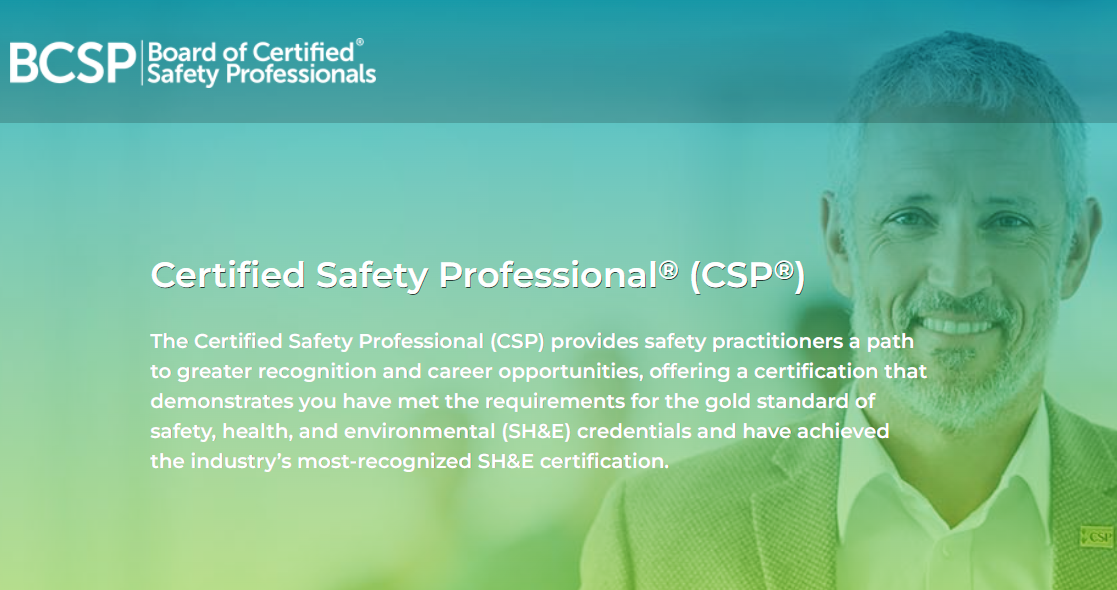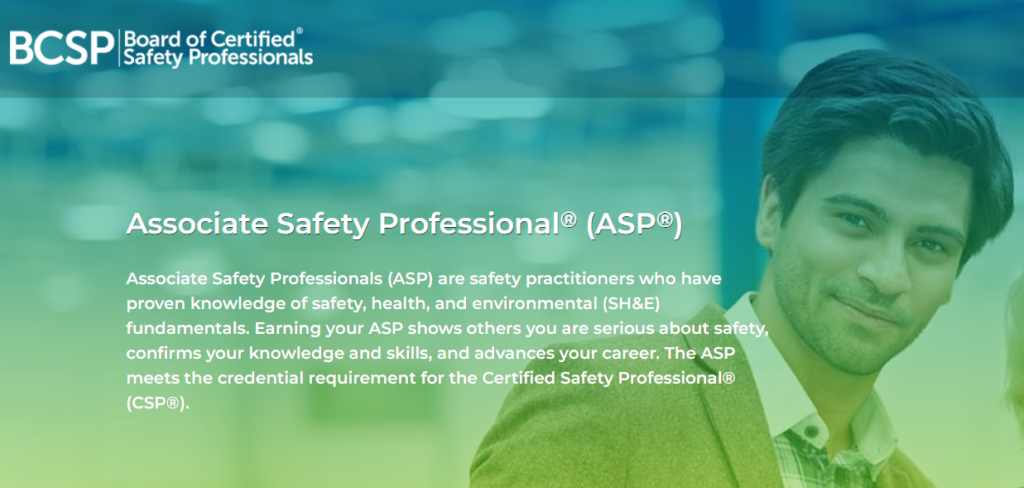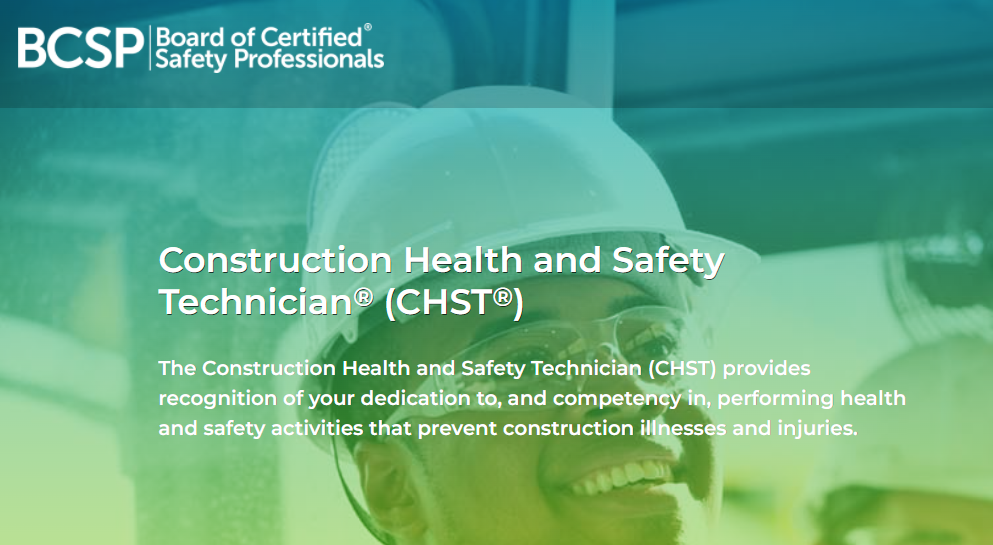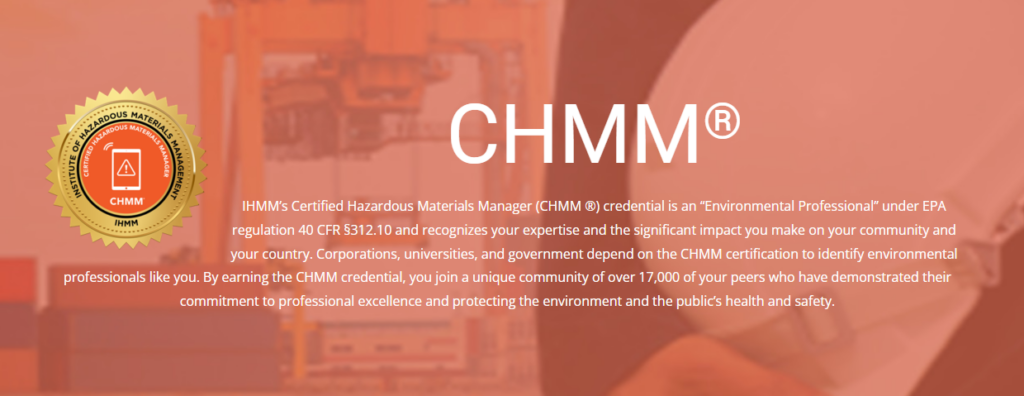Whether you’re new to the EHS field or are several years in, professional development is a great way to stay current and expand your career potential. Listed below are the 6 best EHS certifications that safety professionals can earn. All these certifications are accredited by ANSI (American National Standards Institute) according to Accreditation Standard ISO/IEC- 17024.
While you might not need all the EHS certifications listed in this post, each comes with its own professional benefits. Depending on where you want to go next in your journey, a certification may be the factor that ends up earning you your next role.
Certified Safety Professional (CSP)
The Certified Safety Professional certification is the most well-known EHS certification. It is considered the industry gold standard and is the highest professional certification that an EHS Professional can receive. Requirements for the CSP include:
- A minimum of a bachelor’s degree in any field
- Four (4) years of safety experience, where safety is at least 50% preventative, at the professional level with breadth and depth of safety duties
- One of the following Qualified Credentials: Associate Safety Professional (ASP), Graduate Safety Professional (GSP), Certified Industrial Hygienist (CIH), and others not listed here
- Passing the CSP Exam
- Meeting recertification requirements
You can earn this certification through the Board of Certified Safety Professionals (BCSP).

Associate Safety Professional (ASP)
Another BCSP accreditation, the Associate Safety Professional certification is well-known in the EHS profession. Many individuals obtain their ASP certification as a prerequisite for their CSP certification. Requirements for the ASP include:
- A minimum of a bachelor’s degree in any field or an associate degree in safety, health, or the environment
- One (1) year of safety experience, where safety is at least 50% preventative, at the professional level with breadth and depth of safety duties
- Passing the ASP examination
- Meeting recertification requirements
This is a great option for professionals who are just a year or two into their field. Especially if you want to switch industries, being an ASP can help you edge out your peers who are applying for similar jobs.

Occupational Hygiene and Safety Technician (OHST)
The Occupational Hygiene and Safety Technician certification is recognized for those who perform occupational hygiene and safety activities on a full-time or part-time basis as part of their job duties. Requirements for the OHST include:
- Working part-time or full-time in occupational health or safety (35% is the minimum) and have duties that require technical skills and knowledge in occupational health or safety
- Three (3) years of experience in occupational health or safety
- Passing the OHST examination
- Meeting recertification requirements
You can earn the OHST certification through the BCSP. The OHST exam training resources cost $99 on their website.
Construction Health and Safety Technician (CHST)
The Construction Health and Safety Technician certification targets individuals who work part-time or full-time in health and safety activities that are devoted to the prevention of construction illnesses and injuries.
The CHST certification meets national standards for certifications. Individuals who sit for the CHST certification are usually employed as Environmental, Health, and Safety (EHS) Specialists on construction job sites. Requirements for CHST include:
- Working part-time or full-time in construction safety (35% is the minimum) and have duties that require technical skills and knowledge in health and safety
- Three (3) years of experience in construction health or safety
- Passing the CHST examination
- Meeting recertification requirements
If you visit the BCSP’s website, you can find an examination blueprint which outlines the test you would take for this certification.

Certified Industrial Hygienist (CIH) – American Board of Industrial Hygiene (ABIH)
The Certified Industrial Hygienist certification is for individuals who have knowledge and skills in industrial hygiene topics. Requirements for the CIH include:
- Bachelor’s degree in biology, chemistry, engineering, physics or an ABET-accredited program in industrial hygiene or safety
- Several years of professional experience
- Passing the CIH Exam
- Meeting recertification requirements
Become a CIH through the Board for Global EHS Credentialing (ABIH). Visit their website to learn more about how others have used this certification to advance professionally.
Certified Hazardous Materials Manager (CHMM)
The Certified Hazardous Materials Manager certification is for individuals who have experience identifying and handling hazardous materials, as well as planning, preparing, and responding to hazardous material emergencies. Requirements for the CHMM include:
- Bachelor’s degree (or higher) from an accredited college or university
- Four (4) years of relevant experience in the field of hazardous materials management or a related field.
- Passing the CHMM Exam
- Meeting recertification requirements
The Institution of Hazardous Materials Management (IHMM) offers this certification to safety professionals across the country. You will need to visit an approved testing center to sit for the exam.
There are many more valuable EHS certifications that are not listed above. However, these options are a great starting point for anyone looking to level up within their industry. And since they are all ANSI accredited, you can put them on a resume, and they will be easily recognized by other professionals.

Other Factors to Consider With EHS Certifications
When determining which certification is right for you, be sure to choose one that is from an accredited organization. This ensures the certification’s validity and protects the integrity of the certification program.
If you do more research to find an EHS certification that’s right for you, keep in mind that there is a difference between a certification and a certificate:
| Certification | Certificate |
| Results from an assessment process | Results from an educational process |
| Requires some professional experience | For both novice and experienced professionals |
| Awarded by a third-party, standard setting organization | Awarded by a training or educational program |
| Indicates competency | Indicates completion of a course |
| Usually results in designation to use after one’s name | Usually listed on one’s resume in the education section |
| Has on-going requirements to maintain such as recertification or continuing education | Individuals may not need to demonstrate knowledge over time to keep the certification |
Reasons to Get EHS Certifications
Some of the most common reasons why EHS professionals obtain certifications include:
- Increased opportunities for career advancement
- Personal development and satisfaction
- Potential for increased salary
Additionally, receiving an EHS certification is important because it:
Demonstrates competency: Individuals with certifications are recognized as having met the professional challenge of illustrating expertise in their respective field. They are among the most highly trained, educated, and experienced individuals in the EHS profession.
Provides competitive advantage: Individuals with a certification are more likely to earn more money and receive more promotions than their peers without certifications. According to the Board of Certified Safety Professionals, certified EHS professionals earn $20,000 more per year than those with no certification. They also assert that those with a CSP certification earn even more, with $30,000 more per year.
There’s no doubt that earning one of these certifications can provide you with more opportunities throughout your career. Also, the relative up-front cost of sitting for a certification exam is usually much less than the salary increase you will likely see once you’ve become certified.




